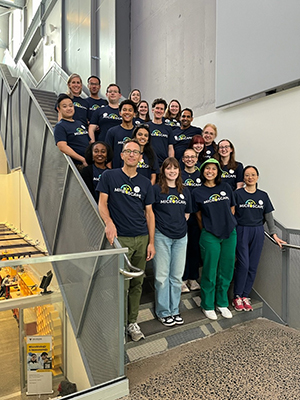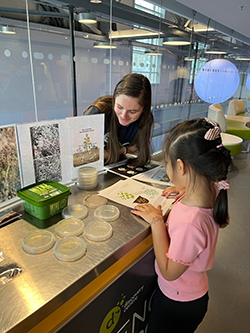Planet Earth is dominated by microbes. Just a single drop of seawater contains millions of bacteria and viruses that can only be seen under a microscope.
тThe microbial world is like a universe that can be opened up if you know how and where to look,т says Dr. John Archibald, the director of УРХЎзіАЎтs (ICG).Ь§ Ь§
 Dalтs ICG, with more than 30 faculty members and 150 trainees, is spread across four fields of knowledge т medicine, science, computer science, and agriculture. With a goal of uniting all the areas of study, Dr. Archibaldтs idea to create a youth-focused outreach program through a common interest in genomics evolved organically.Ь§Ь§
Dalтs ICG, with more than 30 faculty members and 150 trainees, is spread across four fields of knowledge т medicine, science, computer science, and agriculture. With a goal of uniting all the areas of study, Dr. Archibaldтs idea to create a youth-focused outreach program through a common interest in genomics evolved organically.Ь§Ь§
In partnership with the Discovery Center, Atlantic Canadaтs largest science centre, the MicroScape program was established to allow a combination of research, teaching, and training to happen through a single avenue. MicroScape is an initiative led by volunteer faculty, researchers, and professional scientists to deliver experiential learning of the microbial world to youth ranging from kindergarten to Grade 12.
The program is unique from others in that it was developed by a research institute, rather than a traditional outreach organization.Ь§ Ь§Ь§
Shown above right: Dr. Archibald, front left, with MicroScape volunteers.
тItтs an experiment in what we can do as a community when we decide and agree that something is important and valuable,т says Dr. Archibald.
The plan transitioned into a project when Dalтs ICG received a three-year government grant through NSERC PromoScience, a national program offering financial support to organizations that promote an understanding of science in young Canadians.Ь§
In addition to PromoScienceтs annual grant of $50,000 for three years on a renewable basis, the Discovery Center and co-sponsor, Genome Atlantic, the regional center for genome research, provided matching funds.Ь§
тIt's important to fund any type of program that is reaching youth in STEM to make sure we keep having a next generation of scientists and engineers,т says Carolyn Bjerring, a program officer at NSERC.Ь§
Bright faces
In January, the MicroScape program launched its pilot year. Thus far, MicroScape has celebrated International Biodiversity Day in May and International Microorganism Day last month at the Discovery Center. Dal ICG members set up individual stations where kids participate in activities such as building microbes out of Play-Doh.Ь§
David Mahoney, a current УРХЎзіАЎ grad student, volunteers at MicroScape events teaching agriculture microbiology. He says kids leave with bright faces, understanding that тwithout certain microbes participating in plant symbiosis, we wouldnтt be able to feed the population.тЬ§Ь§
A primary focus for the MicroScape program is the integration of unrepresented communities, including African Nova Scotians and Indigenous youth, into STEM.Ь§Ь§
 Dr. Joseph Bielawski, a professor of biology, mathematics, and statistics at УРХЎзіАЎ says, тData shows marginalized groups enter at a low rate and drop out of STEM at a higher rate.тЬ§Ь§
Dr. Joseph Bielawski, a professor of biology, mathematics, and statistics at УРХЎзіАЎ says, тData shows marginalized groups enter at a low rate and drop out of STEM at a higher rate.тЬ§Ь§
He refers to this disparity as the тleaky pipeline.тЬ§
тWe know that at every stage, there is a significant barrier which causes people to not apply or leave the program.тЬ§ Due to a lack of mentors, Dr. Bielawski says, тThe only way to counter this is to develop programs that actively foster their engagement and give them an opportunity and positive role models in order for them to become future role models themselves.тЬ§
Dr. Archibald says, тYou canтt get interested in something until you are exposed to it. Unless you have the connections and the [opportunity].т Ь§Ь§
The next generation
In a three-year strategy, MicroScape plans to reach 3,000 youth and more than 200 teachers through various steps including public events, high-school project-based learning, garden-based camps, teacher professional development, and classroom workshops.Ь§
With high-school engagement expected to begin in winter 2025, Dal ICG members believe that with enough enthusiasm, it can become a self-sustaining initiative that guides future generations into the critical fields of microbiology and genomics.

